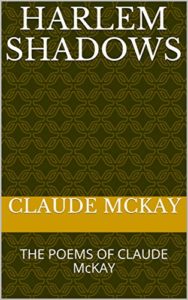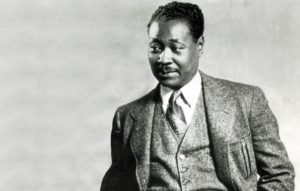The voice of Claude McKay lives on
At 22, Claude McKay (1889-1948) published his first book, Songs of Jamaica., reflections of Black life in the country told in dialect. It was 1912. The stipend from an award for the book helped him to travel to the United States, where McKay wanted to study modern agricultural practices and bring them back to his country. He briefly attended Tuskegee Institute in Alabama before landing at the University of Kansas. During the next two years, the pull of words changed his focus. By 1914, McKay knew he was a poet.
In 1922, now living in New York, McKay published a collection of poems entitled Harlem Shadows. It was one of the early literary productions of what would come to be known as the Harlem Renaissance, a gathering of poets, writers, musicians, and artists from the late 1910s to the 1930s that included Zora Neale Hurston, Langston Hughes, Alain Locke, Hubert Harrison, and many, many others.
One of the mileposts of the era was a poem, “If We Must Die,” published in 1919 as a response to waves of the violence by whites against Blacks that year, itself bound up in the Red Scare of 1919-1920. McKay was the author of “If We Must Die,” and the 14-line sonnet was a call to stand firm and fight back against mob violence.
The more than 70 poems of Harlem Shadows describe McKay’s reflections on race, race relations, America, life in New York City and Harlem, his family in Jamaica, being an outsider in society, poetry, his travels, and many other subjects. The poems are striking in both their beauty and their realistic, understanding eye. The title poem is an example.
Harlem Shadows

In Negro Harlem when the night lets fall
Its veil. I see the shapes of girls who pass
To bend and barter at desire’s call.
Ah, little girls who in slippered feet
Go prowling through the night from street to street!
Through the long night until the silver break
Of day the little gray feet know no rest;
Through the lone night until the last snow-flake
Had dropped from heaven upon the earth’s white breast,
The dusky, half-clad girls of tired feet
Are trudging, thinly shod, from street to street.
Ah, stern harsh world, that in the wretched way
Of poverty, dishonor, and disgrace,
Has pushed the timid little feet of clay,
The sacred brown feet of my fallen race!
Ah, heart of me, the weary, weary feet
In Harlem wandering from street to street.

Claude McKay
The poem is built around the images of feet and the repetition of “street to street.” Through the three stanzas, the feet move from “slippered,” presenting an image of glamor, to gray and tired, suggesting monotony, and finally to clay and weary, leading to nothingness. It might also describe the stages of a prostitute, from young and alluring to old and forgotten. What is constant are the streets that are wandered; the streets are always there.
During his lifetime, McKay also published five novels, a novella, collections of short stores and essays, and two autobiographical works. Other works were published posthumously. Like many writers and artists of the period, McKay embraced socialism and then communism but became disillusioned. He eventually found a home in Catholicism and Catholic social work. He died from a heart attack in Chicago in 1948 and was buried in Calvary Cemetery in Queens, New York City.
Even after almost 100 years since their publication, the poems of Harlem Shadows are vibrant, original, and beautifully constructed. More than 70 years after his death, McKay’s legacy lives on, his voice for recognition, courage, and determination still sounding contemporary.
Photo by Tête à Tête, Creative Commons, via Flickr. Post by Glynn Young.
How to Read a Poem uses images like the mouse, the hive, the switch (from the Billy Collins poem)—to guide readers into new ways of understanding poems. Anthology included.
“I require all our incoming poetry students—in the MFA I direct—to buy and read this book.”
—Jeanetta Calhoun Mish
- “Your Accent! You Can’t Be from New Orleans!” - October 9, 2025
- Poets and Poems: Donna Vorreyer and “Unrivered” - October 7, 2025
- Poet Sidney Lanier and the Lost Cause - October 2, 2025


Leave a Reply